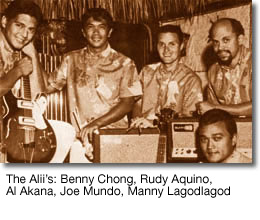
Five nights a week, Don Ho sat center stage behind his Hammond chord organ, singing some of his favorite songs and "talking story" with his audience. He taught the visitors how to make a "shaka" sign. Holding up his right hand with thumb and pinky finger extended, as he said, "This means Family in Hawaii," and jokes, "or at least it did when I was growing up. Nowadays to the kids, it just means 'hang loose.'"
What Don Ho did is easier to describe than how he did it. He lounged at the organ, caressing the keys. He sang a song in a sleepy, intimate voice. He got the audience singing and clapping until pretty soon individual members of the audience were on stage to be kissed and hugged and teased. But his magic is harder to pinpoint.
Donald Tai Loy Ho was born, the second of eight children, in the little Honolulu neighborhood of Kakaako, of Hawaiian, Chinese, Portuguese, German-Dutch parentage. His mother Emily "Honey" Leimaile Silva Ho and his father James "Jimmy" Ah You Ho soon moved the family to Kaneohe. Don's climb to the heady heights of show business began in a cocktail lounge named after his mother, located in the Windward Oahu town. Returning from his career as an Air Force pilot, Don came home to manage Honey's. It was packed everyday during the years of World War II. "When I took it over, the place was empty," says Ho. "My dad said 'Son, why don't you go make music.' "
Ho gathered a couple of friends who knew how to play musical instruments and started a band. "I was terrible," says Ho. "So, I just played very softly." To everyone's amazement, business boomed.
 Playing and learning from the talented musicians he hired, and incorporating the "local-style" of calling upon the singing or hula talents of the audience, Ho created his own musical image. In 1962, Ho began playing in Waikiki, eventually leading to his multi-year, engagement at Duke Kahanamoku's in the International Marketplace. "That's when things started happening for us with records, TV shows and everything," says Ho. These were the days of Don's greatest development as an entertainer and a star. Backing him were the five Fabulous Aliis: Joe Mundo playing piano, Al Akana on drums, Benny Chong on guitar, Manny Lagodlagod on bass and Rudy Aquino on xylophone, percussion and doubling on half-a-dozen other instruments. Don presided at his organ, a glass of Chevas Regal in his hand, a cigarette burning in the ashtray. The music was outstanding; the humor was fast and snappy. Tourists came, but so did locals and, after a while, visiting Hollywood stars--any of whom might take to the stage. Three shows a night, seven nights a week, Don would raise his glass in salute to the packed house, urging the audience to "Suck'em Up," and they did.
Playing and learning from the talented musicians he hired, and incorporating the "local-style" of calling upon the singing or hula talents of the audience, Ho created his own musical image. In 1962, Ho began playing in Waikiki, eventually leading to his multi-year, engagement at Duke Kahanamoku's in the International Marketplace. "That's when things started happening for us with records, TV shows and everything," says Ho. These were the days of Don's greatest development as an entertainer and a star. Backing him were the five Fabulous Aliis: Joe Mundo playing piano, Al Akana on drums, Benny Chong on guitar, Manny Lagodlagod on bass and Rudy Aquino on xylophone, percussion and doubling on half-a-dozen other instruments. Don presided at his organ, a glass of Chevas Regal in his hand, a cigarette burning in the ashtray. The music was outstanding; the humor was fast and snappy. Tourists came, but so did locals and, after a while, visiting Hollywood stars--any of whom might take to the stage. Three shows a night, seven nights a week, Don would raise his glass in salute to the packed house, urging the audience to "Suck'em Up," and they did.

Those rowdy, rollicking years brought stardom to Don and made Duke Kahanamoku's Hawaii's most popular nightclub. Don, The Aliis, Duke Kahanamoku, Kimo McVay, young singers like Robin Wilson, Vickie Burton, Angel Pablo, Sam Kapu and everybody else on stage had a ball every night. The audience felt it and shared it and kept coming back for more. During his years at Duke Kahanamoku's, Don literally erupted on the national show-biz scene, first and most suddenly in a two-week engagement at Hollywood's ultra-posh Cocoanut Grove in 1966. His opening night was a triumph, breaking all previous attendance records, as he went on to play to turn-away crowds nightly.

With such a "debut," other opportunities naturally followed: return engagements at The Grove, feature spots at The Sands in Las Vegas, Harrah's at Lake Tahoe, the Palmer House in Chicago, the Americana Hotel's Royal Box in New York, TV guest appearances with Johnny Carson, Art Linkletter, Joey Bishop, Andy Williams, Johnny Cash and a number of his own hour-long color TV specials sponsored by Singer and Kraft - along with a clutch of best-selling LP record albums for Reprise. From his home based in Hawaii, Don spanned The Pacific to discover old and new fans all over the country.